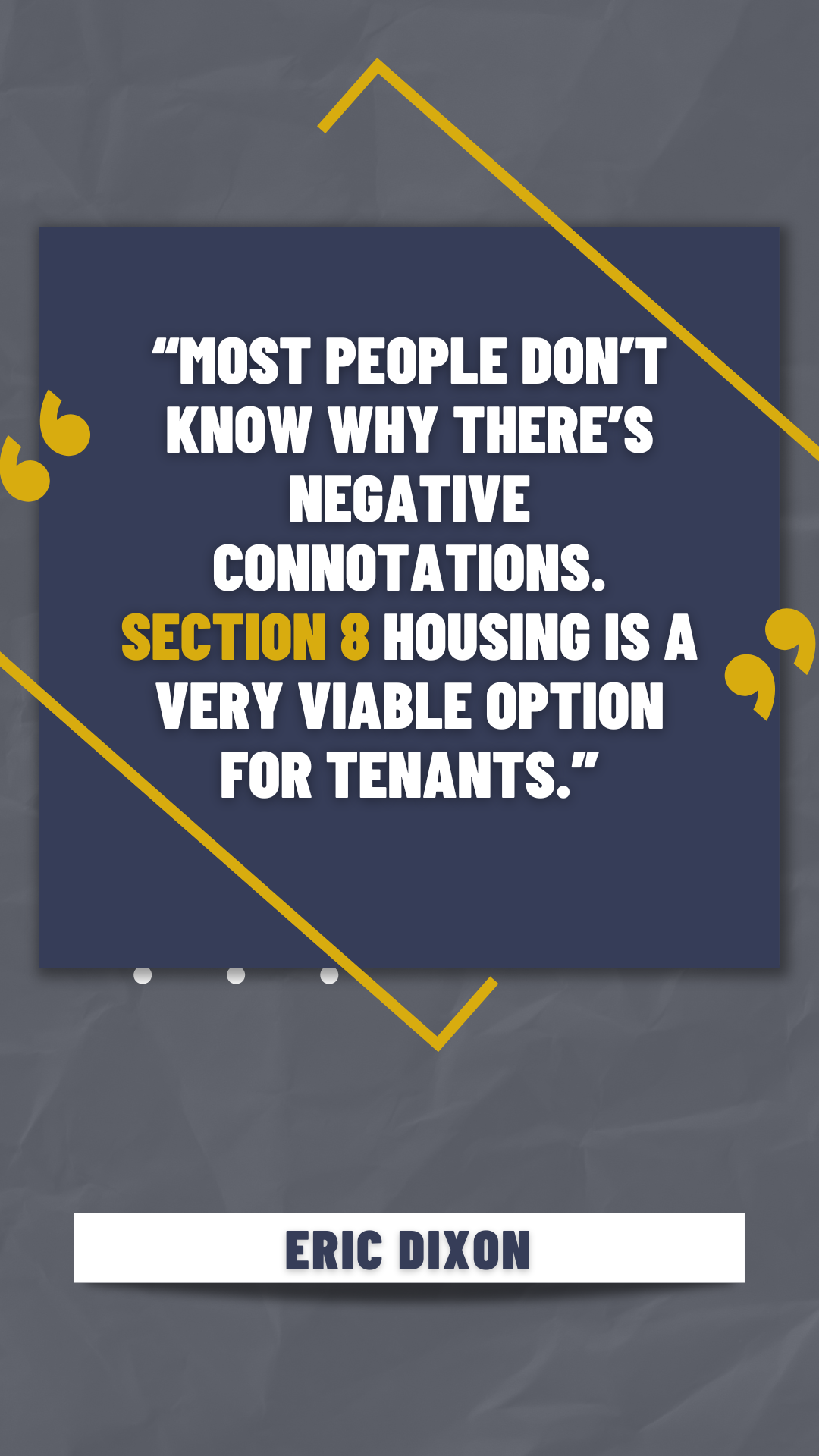REAL TALK RENTALS
Episode 21: Inside The World Of Section 8 Housing
Are you considering managing a Section 8 property? Looking to gain insight into what you can expect? We're here to help! In this episode, Ben and Ericl discuss the ins and outs of Section 8 housing management so that you can make an informed decision about taking on a rental. From tenant qualifications to regulations, we've got the knowledge and information you need to make the best decision for your business. So listen in and learn the basics of managing Section 8 housing properties!
This episode covers:
- What is Section 8
- Fair Housing
- Slum Lords
- Screening Process
Inside The World Of Section 8 Housing
Ben Bailey: Coming up on today's episode of Real Talk Rentals, we're going to go through the ins and outs of Section eight. Welcome back to Real Talk Rentals, a podcast brought to you by Oncue Property Management. We're here to give you all the tips and tricks to owning a rental property and everything that goes on behind the scenes. I'm Ben. I'm your host with me, as always, Mr. Eric Dixon, the go to expert on all things property management out here in Arizona. And today we're going to be talking about something that I have to admit I knew almost nothing about until we started researching this. And that is Section eight. It's a think some people are kind of hesitant to even discuss it because they don't know the ins and outs of it.
Eric Dixon: Yeah, I would say that's actually that's accurate. Most people, they don't. There's no negative connotation. It's really just, hey, I've no idea what that is. Yeah. And so they may have heard it on TV or news or just in the water cooler or something. But yeah, I mean it's something that as property managers and landlords and maybe tenants as well, if you don't know what it is, it is a, it's a viable option out there for you as well. Yeah.
Ben Bailey: And it's something until I started working in this industry, you know, it comes up even though you know, whether you offer working with it or not, you're going to get people reaching out. So that's why we thought, All right, let's dive into this a little and it'll be a good learning lesson, especially for me. Who knows nothing. So, Eric, what exactly is Section eight?
Eric Dixon: Section Section eight? Yeah. So I actually learned in 2000, I think it was way back in 2007 or 8 when I got licensed. I asked my broker because one of my clients was asking about it. Sure. And I was brand new. I'm like, I have no idea. Let me go ask my broker. And my broker is like, We don't do anything with Reynolds dude. Like, that's a housing program. It's a voucher program. Like, don't worry about it. Kind of just scooted me along my way, right? Um, but diving into it just to give a brief history, Section eight is it was, it's a program, government subsidized program authorized under the Housing Act of 1937. So this thing's going back almost 100 years. And the goal is to provide, um, residential housing solutions for low income families, disabled and elderly individuals or families that want safe and sanitary shelter. Sure, that's essentially what it is, Right? So providing housing for those that have trouble, either having the income to pay, maybe market rent or the ability physically to even show a house, look at a house or whatever. So in general, just like many, many, many government programs, it's an amazing program that some take advantage of in a bad way. Some take advantage of it in a wonderful way, and it's just right. You need to know the ins and outs of it. Um, it's a voucher based program, so you do have to qualify. And at least in Arizona, I'm not sure nationwide what this looks like, but there's a huge waiting list right here in Arizona. So it you know, it is a voucher thing that once you qualify, you have that voucher in hand. And if you're going to be on this program for a short or long period of time, it's kind of a it's hard to get. So, um, you know, we see people call all the time and say, hey, do you accept Section eight vouchers? And we're like, Oh, we totally do. Do you have one? And they're like, No, but I'm on the list, but I'm on the list. And it could be tomorrow. It could be three years from now.
Ben Bailey: Yeah, because I know here when we were looking it up and I'm sure other places there's a lottery system to it. So it's not even necessarily.
Eric Dixon: It's not even first come, first serve. Yeah. Hey, I'm coming up. It's like you could be in the lottery system for a long time. Right? Right. And there are I guess this we're talking about Section eight in particular, but there are very similar programs in each municipality. You know, the city of Chandler, the city of Mesa, city of town of Gilbert, um, you know, in Section eight, Maricopa County and Pinal County, like just in Arizona, there's all sorts of different ones. Um, Section eight is just kind of one of the most popular bigger programs, but it's becoming more and more of a necessity, number one, with inflation and, you know, unemployment and different things and with disabilities and elderly. But in addition to that, it's we need to become more educated on it because it is happening every day. We get phone calls for it every single day for sure.
Ben Bailey: And one thing that really struck me about it and you mentioned it right in that first thing was the, um, the safe and sanitary shelter. Because like, when I first thought of this, it's like, well, it's a voucher program. You're going to get like these slumlords who are like, Oh, sweet. You know, I'll take all of you guys in. But there's actually a process where you're your rental has to be approved. It has to be inspected and up to up to snuff.
Eric Dixon: Yeah. And there's, you know, I feel like I'm beating a dead horse here, but there's people take advantage of it in a bad way and good way. But we, we tend to attract the the good landlords that are, you know. Playing by the rules per se. And Section eight does inspections in addition to our inspections, is the third party manager go in at least renewal? They verify their income to make sure they're not taking advantage of the program. Hey, you make way too much money to be in this program or whatever it is. Sure. And then there's a lot on the line for these tenants that that are part of the program to take care of the property, because if they don't, they could get kicked out of the program. Right. And so and then you're blackballed and you're not going to get this voucher again. Right? So there is an incentive to to take care of the property, to be a good tenant, to, you know, pay your portion of the rent every month and so forth.
Ben Bailey: Um, so to that then what? How is it different if you are renting, if you're a landlord, you own a property and you're renting to tenants who are using a Section eight voucher, how is that different? To someone who's renting without one.
Eric Dixon: I would say there are a few subtle differences, but there's kind of the pros and cons, right? The pros are once the payment is coming in, it's pretty automatic. Like they just kind of cut you a check every month. You're actually getting rent. And so Section eight, it may be 100% coverage where the Section eight program is covering 100% of the rent. It could be the tenants paying 300 and section eight's paying 1500, you know, for an $1,800 total rent. So depending on what you qualify for, the section eight's portion is pretty automatic. So it's awesome from a landlord's perspective that at least rent. Yeah, I'm not chasing rent every month. The property manager is not chasing rent. There may be other, you know, other issues that you have to deal with, but that is one positive on the negative side of the payment, it's you're working with the government. So there is it's slow, there's more paperwork. The initial payment is slower to get. But once you're in the system, you got it. Yeah, you got it made right.
Ben Bailey: They love their.
Eric Dixon: Paperwork. They love their paperwork. And so and what kind of sucks is the the people on the other end working for Section eight are wonderful and their hands are tied. Oh, absolutely. Oh, yeah. You know, I have to send you 14 forms. I know they all look the same, but you got to fill this out, out this out. And so it's not a knock on them. Like they're amazing people. It's just the process. Yeah. You know, you have to dot your I's, cross your T's, fax it in, or like, carry your pigeon, you know, just like it's crazy how I was going to say if.
Ben Bailey: It's a government program, it probably hasn't been updated since 1937 when it was initially enacted. So yeah, you got.
Eric Dixon: To take the trolley, the railroad over there. Yeah. So there's another pro is that there's annual increases kind of built in based off percentages. Okay. Now not all the time will it keep up with market rents, let's say in the market, rents are going up 5 to 10% a year. The last several years have been very steep and Section eight hasn't been as steep. But over a ten, 15, 20 year hall, you'll have these gradual increases. And as a landlord, you're not paying for vacancy and utilities during vacancy, you're not you know, typically these are long term tenants. And so it's kind of it can be a pro or it could be a con. It's like, well, yes, you get positive increases every year, but maybe they're small. So it's like the good thing is they're positive increases. The bad thing is they're not as big as if you went on the open market. Um, but there also are pockets of like, you could get a voucher for a four bedroom in Gilbert and you're like, Dude, that's market rate. Like they're, they're willing to pay total market rate, right? Whereas in another city, another county, it may not be the market rate.
Eric Dixon: Exactly. So, sure, you kind of just have to play the game a little bit there. I would say another negative potentially is that the approval process can take more time, right, than just going on the market and getting somebody not on the program. But at the same time, it doesn't necessarily mean that that market quote, market applicant is better. You know, it may not be better at all. You know, and so you still go through the normal screening process, credit income, debt, criminal history, landlord history, you know, evictions, and you go through all of that. And so there's not, as the tenant goes, they're just as qualified as somebody else. They may not qualify in the income, but that's not what you're qualifying them for. Like you're in the income part is basically guaranteed by the government. Right? You know, so it's not a big worry there. If somebody calls and says, I have a voucher in hand, then it's like, Heck yeah, you apply. Let's let's see if the owner will will work with the inspection and the approval, you know.
Ben Bailey: So yeah. And to your point, we hammer on this show that the biggest cost to a landlord is vacancy. Yeah. And people who are on this program tend to want to stay because they don't want to have to. It's a nightmare for them sometimes to find housing that will accept the voucher. Yeah. So it tends to be they stay longer, they're more long term tenants and you have less of a turnover. Yeah.
Eric Dixon: And I think there's just in any of these programs, a lot of them are just so thankful to be approved in the program. Voucher. I've got a property management company or a landlord that's willing to work with the the government process. And so they get comfortable and they're usually great long term. Like we have a landlord, a couple landlords that they prefer working with Section eight because number one, you're helping people that need special need of help, like they have these special needs that that you can be a solution for. And in addition to that, their income is basically guaranteed. So right. And it is a pain like even from the management side, you know, the the checks come in the mail. They're not always showing up on the first, you know. But yeah, but they do show up. So it's kind of like it's we make it work and we're we're absolutely willing to make it work. But you work with with the government again.
Ben Bailey: Yeah. Um, so to that point, I think people especially, you know, who maybe don't understand the program and just say, I don't want anything to do with it because they don't get it. Can you say no as a homeowner to people that apply?
Eric Dixon: So yes and no. So it's the short answer is, well, the reason you could say no is if they don't qualify on other parameters, like you can't treat them separate or different or special compared to somebody else, so they still have to qualify for credit. Um, background checks and debt to income ratios and stuff. But within the parameters, the income just switches from our minimum requirements and it shifts towards section eight's income requirements. But everything else has to match. So can you say no just because they are section eight? It's like, well, technically you could say, Hey, you don't make enough money, but it's also not the right thing to do, you know? Yeah, qualify Now if you have to hold the property off the market for two months while Section eight is backlogged on their inspections, it's like, no, the landlord's not going to do that.
Ben Bailey: Yeah, they might not be able to afford to.
Eric Dixon: And so the landlord's like, Look, I'd love to work with them, but if they can't move in in two weeks, like I got to go with another qualified applicant and that's not against fair housing and so forth. I think the biggest trick is your property management company should know how to work with Section eight, right? But onesie twosie self managers, it's going to be a headache and you're going to be like, you know, you post your house on Zillow, you rent it out, they apply, and then they're like, Hey, I have a Section eight voucher. You're like, What's that? Yeah, what paperwork? Oh, man. Give me your case manager's info. Let me just figure this out and it will be a learning curve, you know? And so as a self manager, you'll want you may want to say no just because it's like mountains of paperwork and stuff, but at the same point it's worth it. And as long as you learn the system and we've got. Relationships with different counties and cities and their their Section eight reps and don't know if they call them reps or case managers, but they're great. Right. So we're able to work with them. But your onesie twosie people, it's going to can you say no technically, maybe you could say, hey, sorry, you don't make enough money. And they're like, Well, I'm on a government subsidized program. Of course I don't make money. Yeah, but everything else is great. I have great credit, I have great employment history. I just can't work because I'm a single mom or dad and I have to stay home and I need. And so it's like, you want to help those people.
Ben Bailey: If they're what if the homeowner is like, oh, my property, I can't get an inspection or I don't want to do a government inspection. Is that a reason to say you don't want to do it? Yeah.
Eric Dixon: I mean, you could just hey, the house isn't approved, and that's. That's not dishonest. It's kind of beating around the bush a little bit, but it's like, really, once we educate the owners, they're open to it. Sure. The biggest problem I see is that it's just if you have to hold this house vacant for a month, 2 or 3, then it's not going to work. Yeah. Um, you know, if you're not on the voucher program and you call and say, Hey, can I move in in two months? It's like, no, sorry, they need somebody sooner, right? So we treat everybody exactly the same. As far as the owner's concerned, they're most concerned that you check the boxes with qualifications. And if you're on the program on a Section eight or another subsidized program or a rental assistance program, as long as it's legitimate. Yeah, like usually the landlords have no issues with that.
Ben Bailey: All right. So I think there is, as we talked about in the beginning, there is kind of like a stigma or a hesitation, you know, because it's a government program and because, you know, people just assume like, why are these people, you know, using a voucher instead of just giving me the money? Why do you think that is? That there is so much of a stigma on it when people hear that some people just kind of shut down.
Eric Dixon: Yeah, I just think it's the world we live in, right? It's I want to educate listeners and everyone who hears this and everyone that I come in contact with. The stigma shouldn't be about the people. The stigma is about the program. Right? Right. The people are great. Like the. Sure. Some people take advantage of it, but some people take advantage of everything. Right in life. Right. It has nothing to do with that. The stigma becomes that it's it's part of the government. And, you know, people are politically charged one way or the other and they have their opinions and different things. But the stigma needs to stay, if there is one. Stay with the program and realize get yourself educated on the program and realize there are human beings and families behind these vouchers that need housing, you know, whether they're elderly, whether they're low income, whether they're disabled, there's veterans, there's all sorts of wonderful people, families that need the voucher and need the program. And so just remember, that's who you are working with and working. Right? You know, it's so anyway, when somebody says there's a stigma, you almost want to say, no, there isn't. But no, there is. But it's the program. Not right.
Ben Bailey: Not the people. Exactly. Yeah. And I think, too, like, you know, in a perfect world, everybody would love to just be able to. No problem. I can afford this house myself. You know, it's not like they're excited to bring it. And like like you said, there is something special about being able to to help somebody to know, like, hey, this person, I can provide safe sanitary housing for somebody who otherwise wouldn't be able to afford it.
Eric Dixon: Know how Housing in general, which is kind of why I love property management and real estate in general, is you're providing one of the basic necessities of life, which is safe housing. Yeah. And whether it's Section eight, whether it's you have an apartment, whether you have a condo, whatever you have, you're providing housing for somebody. And it's one of the biggest needs in the world is safe housing. So it's this is just one small avenue in which we can place tenants and provide housing to a certain demographic of people. Some people it's temporary. It's get me on my feet. I have the voucher program As soon as I can afford to do so, I'll get out. Some people are going to be on Section eight their whole life, and it's not. You have to think it's not because they want to. Yeah, it's not like, hey, I want to suck the government of all this money. No, it's usually because they're in a they're in a situation that they can't they can't break through that barrier. I mean, there's a lot of physical, mental, emotional needs that they can't have met to make an income. And so anyway, I love it from that perspective that we can provide a solution, you know, for those families. Yeah.
Ben Bailey: All right. Well, I feel like we blew through this super fast here, but it's, uh, I would encourage people look it up. There's so much online, there's so many resources and stuff and make sure you're educated on it and know what it is before you, you know, make that snap judgment and say, I'm not doing that or I am doing it.
Eric Dixon: The one the last thing I will say, we worked with a city locally here in Arizona that has a very similar they call it a Section eight alternative. I can't remember what it's called, but they're kind of governments now, especially the local city governments are trying to roll out very similar programs within their cities and their municipalities and streamlining it to get rid of the paperwork. Think they're realizing you have these 1947 37 programs are outdated. They're old school. They're on old school systems in their computers. They're using fax machines and snail mail. Yeah. And we actually dealt with a local city here. One of our colleagues works for us, said this was so easy. You know, she went through the process super fast and now we're working directly with that city to see if any of our houses match in that city and we can match these families in. So I think over time, you know, it's 2023, we can start being more efficient. Right. And I think the government and the especially on the local level, is going to is going to improve this process and it's going to be it'll be awesome to be able to provide answers. You know, we get these phone calls for people that they need housing worse than anybody out there, but they just either don't have a voucher or they're so early in the process or they just they don't know what they're doing and we aren't able to help them. Yeah. And so we want to kind of, kind of correct that. Yeah, I.
Ben Bailey: Know when you say fax stuff in, it just makes my blood.
Eric Dixon: Whenever somebody asks me to fax something in, this is kind of off topic, but I'm just like, fax. How do you spell that? Is that a, you know, Yeah. My fax like and it's like, Oh, I haven't faxed for a decade. You know, my.
Ben Bailey: My daughter has to see some specialists, some doctors and they will only take certain documents faxed. And it's literally like, I don't, I don't even have a landline man. I can't fax this.
Eric Dixon: By the time you fax something, it's. It's an email. Exactly. Come on. Let's just. Let's just email it, dude. Yeah.
Ben Bailey: All right. Well, that's it for us this time. Be sure to subscribe, follow the show wherever you're getting it, and leave us a five star review. It really helps out. And we will catch you guys next time.
Our Company
On Q Property Management is a full-service Property Management company specializing in managing residential rental properties. On Q's client-first approach - utilizing a proprietary process and set of tools - delivers a more transparent and profitable property management experience. With year-long tenant guarantees and a no-fee cancelation policy, On Q is dedicated to earning you business month after month.
Arizona Designated Broker: Eric Dixon
Texas Designated Broker: Rodney Henson
Texas Real Estate Commission Information About Brokerage Services
Texas Real Estate Commission Consumer Protection Notice











